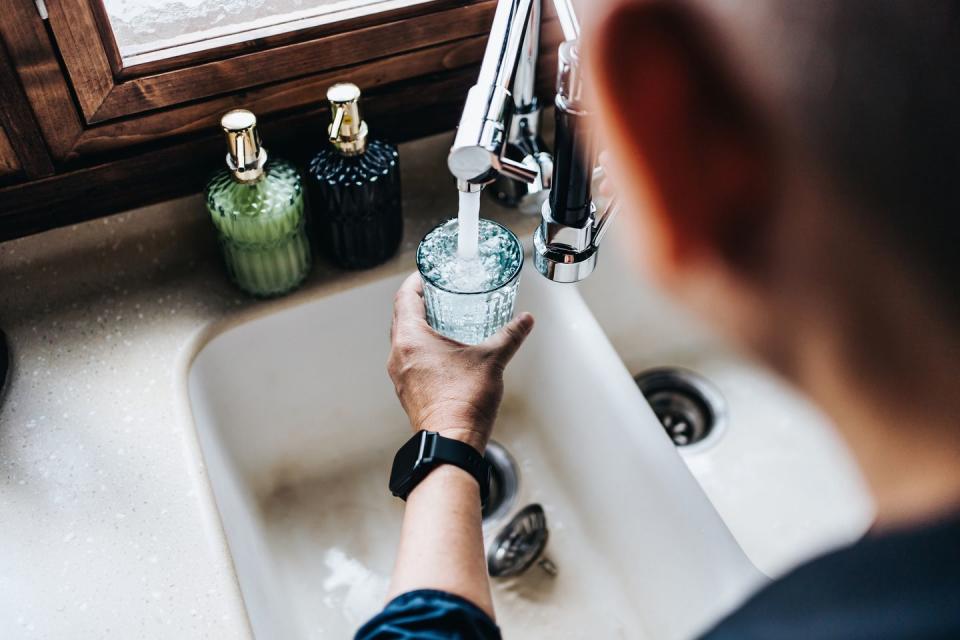Water Fasting Is (Yet Another) Dangerous TikTok Trend to Skip
Of all the diet trends we’ve heard about over the years, water fasting might rank among the most torturous. For multiple days, you don’t eat, drinking water as your only sustenance.
Although this diet sounds like an interrogation tactic designed by an espionage agency, water fasting is being touted by some social media users as a strategy for losing weight and improving health.
Does water fasting actually work—and is it safe?
Maybe, and maybe not. “There’s just not a lot of research, honestly, behind water fasting,” says Krista Varady, Ph.D., professor of nutrition at the University of Illinois, Chicago.
The limited research that does exist suggests that people do often lose weight by water fasting, but these difficult diets put you at risk for potentially harmful side effects. Varady doesn’t recommend doing your own water fasting experiment because a diet this restrictive could be dangerous when done without medical supervision.
Some of the claims about water fasting specifically revolve around the idea that fasting can induce autophagy, your body’s natural process of cellular cleanup and removal of damaged cells. There is limited evidence, often from animal studies, that short-term fasting can increase autophagy, but there’s no published research in humans demonstrating that water fasting is a safe or effective way to induce it.
Here’s what you should know about water fasting and why it’s not something to try solo. If you want to consider a new diet, especially an extreme one like water fasting, it’s important to consult with your healthcare provider beforehand (and during the diet) to make sure you’re losing weight in a safe way.
What is water fasting?
Simply put, water fasting is a water-only diet that lasts two or more days.
Fasting itself is hardly a new idea. Humans have incorporated fasts into their lives for thousands of years, often as part of religious traditions. In the mid-1800s, a few doctors on the fringe started experimenting with fasts for health reasons, and this continued into the 20th century, with a bit of a revival in the 1960s.
Today, on TikTok, you can find all kinds of pseudo-experts touting the benefits of a water fast. Often the goal is weight loss or some other health benefit, like a reduction in cancer risk or an improvement in type two diabetes or high blood pressure.
However, if you have any health condition, you should talk to your healthcare provider before trying any new diet. Spoiler alert: They will probably not recommend a water fast.
Also, it's worth noting that a water fast is not the same thing as a liquid diet.
How do you water fast?
There are no hard and fast rules for a water fast, mostly because there isn’t enough research to establish safety guidelines.
“There's not a lot of published science about it,” says Varady. In the research studies that exist on water fasting, study participants (usually a small number of them) are closely and constantly monitored by medical professionals during the fast and then watched and guided as they are re-introduced to regular food.

The fasts range from two to 41 days with an average of around seven days. In some versions of the fast, participants are allowed a small amount of liquified food, like fruit juice and vegetable soup, each day.
As part of their treatment, study participants might also be given complimentary care, like enemas to clear their guts since the fast blows up their usual poop schedule. Sometimes they stay at a spa and are encouraged to get massages. In other words, these guys aren’t usually at home toughing it out alone, and this isn’t something the average guy should be trying by himself, either.
Is water fasting safe?
Unless you are part of a research study carefully designed and monitored by medical professionals, no.
“I would say it's not a safe choice—definitely not—for people to do on their own,” says Varady.
If you wanted to try just drinking water for one day, which is also known as zero-calorie alternate day fasting, that’s a possibility, says Varady. (Still, check with your doctor first.) But she doesn’t recommend multiple-day water fasts.
One reason: Although you might lose weight on a water fast, you probably will shed more than fat. Water fasting will likely result in lean muscle wasting, or muscle mass loss that occurs when you don’t take in protein, she says.
To compensate, your body starts to break down muscles. You might develop other nutrient deficiencies as well. Again, if you are part of a study where someone checks your blood work regularly for signs of nutrient deficiencies, maybe you could catch these things before they become dangerous. On your own, you could end up in trouble.
Another problem: “I'd be worried about eating disorder propensity,” says Varady. “That seems a little worrisome for me, if you're not eating, it might change your psychology around food if you haven't eaten anything for 30 days.”

And it’s not just the fast that’s potentially dangerous–it’s the period of time when the fast is over and you’re ready to eat everything in sight.
“When you re-feed the person after like, 20 days of water fasting, that can be kind of dangerous, because the person's body doesn't know how to deal with glucose and fat and all this stuff,” says Varady.
This could be even more dangerous if you already have a metabolic problem like type 2 diabetes.
“If somebody has type two diabetes, I would absolutely not do a complete water fast for days unless they're under the careful supervision of a doctor,” says Varady.
What are the risks of water fasting?
Research published in the journal BMC Complementary Medicine Therapies showed that the most common adverse events from water fasting include:
Quality of life problems like fatigue
Heart problems like high blood pressure
Musculoskeletal problems like arthritis
Gastrointestinal problems like colitis, gastritis, and constipation
Endocrine problems like thyroid trouble or diabetes
Neurological problems like headache, neuropathy, and dizziness
Urologic and renal problems
Psychiatric problems like depression and anxiety
Pulmonological problems like inflammation, labored breathing, and infection
Two people in the studies analyzed required hospitalization, one with severe dehydration and another with dangerously low sodium levels.
In a recent study of middle-aged men from Poland who did an eight-day water fast, patients lost weight and perceived a reduction in stress, but their bodies experienced some negative consequences including dehydration, low sodium levels, low blood sugar levels, and an increase in uric acid in their blood.
The study authors concluded: “Therefore, for the safety of middle-aged people subjected to [an] eight-day water fast, it is recommended to discontinue such intervention, as it is a drastic form of fasting that already begins to generate unfavorable symptoms for a healthy person."
Is there a safer way to fast?
Yes. Intermittent fasting, where you eat normally during an eight-hour window of the day and then drink water for the rest of the day, is much safer.
Intermittent fasting has been studied for decades, and it allows you to eat real food. Drinking only water for two-thirds of the day (and that includes the time when you’re sleeping) is much safer than drinking only water for days on end.
“If somebody wants to lower their fat mass while maintaining a lot of their muscle mass, you know, it makes more sense to just do simple intermittent fasting,” says Varady.
During intermittent fasting, people tend to naturally reduce their energy intake by about 500 calories, so they lose about a pound or two per week, she says.
In her research studies on intermittent fasting, constipation is a common side effect, but it usually resolves in a couple of weeks—no daily enemas needed. Mild headaches and dehydration can also occur but usually resolve with increased water intake.
You Might Also Like

